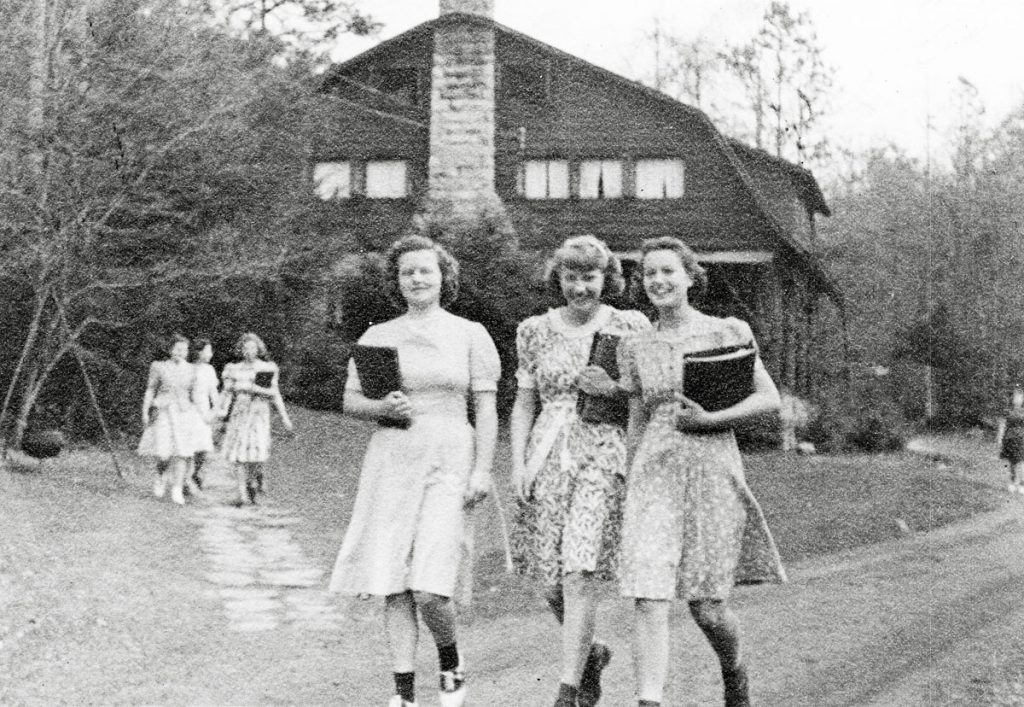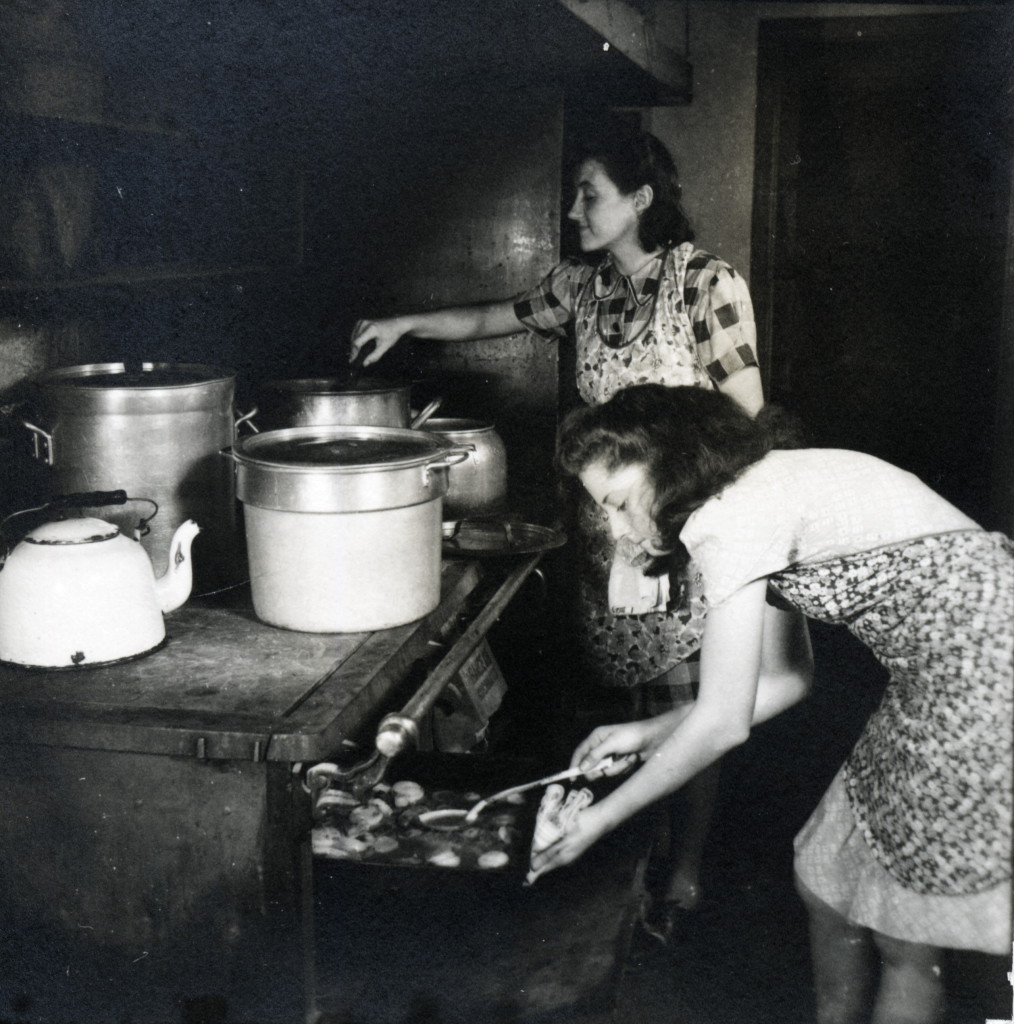Pine Mountain Settlement School
Series 18: Publications Related
Walter P. Oldendorf
Pine Mountain Boarding School 1930-1949
1981 publication

Opal Hall, Ruth Anne, Bonnie, Marie P. at PMSS [098_IX_students_02_2437005.jpg]
TAGS: Walter P. Oldendorf, Berea College, Berea Education Department essays, rural education studies, Appalachian Studies Conference, Appalachian Study Project, Pine Mountain Boarding High School, “hard” and “soft” academic disciplines, activism, objective scholarship, John Dewey education, boarding high schools, community-based education, John P. Stephenson,
STUDIES SURVEYS …
WALTER P. OLDENDORF Pine Mountain Boarding High School: A Unique Educational Community, 1930-1949
Walter P. Oldendorf (1937-2010) was an Assistant Professor of Education at Berea College, Berea, Kentucky, in the 1980s. He had a special interest in the Pine Mountain community and produced several studies of the people, the surrounding region, and the Pine Mountain Settlement School that served the deeply isolated region in the early years of the twentieth century. His earlier study, prepared under the auspices of the Mellon Foundation in 1981, forms the foundation of his article for CRITICAL ESSAYS IN APPALACHIA LIFE & CULTURE. His COMMUNITY BASED EDUCATION AT PINE MOUNTAIN SCHOOL was offered as a Faculty Lecture given in Rogers Auditorium at Berea College in September of 1982.
John Stephenson, a former President of Berea College, and others noted in the Proceedings of the 4th Annual Conference of the Appalachian Studies Conference that the conference of that year worked hard to bring together diverse activities of those working in the Appalachian region. The effort to bring together community and academic interests can be found in many of the presentations. In 1982 the proceedings of the 5th Annual Conference were edited by Rick Simon and published by the University of North Carolina Press under the title Critical Essays in Appalachian Life and Culture: Proceedings of the 5th Annual Meeting of the Appalachian Studies Conference.
Included in the UNC Press publication was a brief overview by Walter P. Oldendorf of ideas he had presented in an essay delivered at the National Council for the Social Studies College and University Faculty Assembly at Berea in November of 1981. The essay was the culmination of Oldendorf’s Appalachian Study Project funded by the Mellon Foundation. It was entitled, “Pine Mountain Boarding High School: A Unique Educational Community, 1930-1949.” The essay, as summarized by Oldendorf, seeks to situate the Boarding High School “into a context of three contrasting points of view, These three views focused on the role of the school, described the structure and function of the curriculum, and summarized comments from its graduates about the qualities of their education.
John Stephenson remarked on the efforts of the 1982 Conference as a whole, that it evidenced “ … a surprising degree of specialization and sub-specialization and a consequent fracturing of our attention.” Rick Simon reinforced this view when he said
The 1982 conference reflects this as most sessions were organized around disciplines: cultural history, linguistics, religion, politics….Moreover, the divisions within Appalachian Studies, as within other regional studies groups, inevitably reflect political and methodological differences. The political differences ultimately concern beliefs as to the best strategies for change and where we want those changes to lead. 5 But it is the methodological concerns which call forth the greatest debate among Appalachian Studies participants. The tension between the “hard” and “soft” academic disciplines has received the greatest attention. 6 There is the related difference between those who view the proper role of the regional student as activist and those who urge an “objective” non-participant role. 7 A final methodological difference is that between (what I refer to as) the globalists and the localists, those who analyze Appalachia as part of a larger social context and those who analyze Appalachia as unto itself. 8 These differences will be of unequal importance in the 1980’s.
Critical Essays in Appalachian Life & Culture, Proceedings of the 5th Annual Appalachian Studies Conference, edited by Rick Simon, University of NC Press 1982.
In 2019 this “fracturing of attention” and the tension between “hard” and “soft” academic disciplines, activism, and objective scholarship, has not gone away. It has intensified in the minds of the many Appalachians, and scholars of the region. Oldendorf in his 1982 essay attempted to put these viewpoints within the rubric of ideological concepts —“assumptions and assertions about learning” but he shows a particular bias. He cites three as central to the educational debate: subject-centered; child-centered; and Deweyan.
It is the Deweyan educational track that Oldendorf foregrounds and pursues in his exploration of the Boarding High School at Pine Mountain, The School which was active between 1930 and 1949 is described by Oldendorf as a progressive experiment and specifically as “an outstanding example of the implementation of Deweyan notions in a very isolated section of Eastern Kentucky’s Harlan County ….” He further suggests that the model was more likely to be found in the academic practice of higher education — in colleges and universities than in high schools, particularly rural high schools as remote as that of Pine Mountain, and for those reasons was remarkable and “outstanding.”

Dieter Album. Students cooking in the Laurel House II kitchen. [shul_011.jpg]
GALLERY
- 00 oldendorf_1981_pmss_000
- 01 oldendorf_1981_pmss_001
- 02 oldendorf_1981_pmss_002
- 03 oldendorf_1981_pmss_003
- 04 oldendorf_1981_pmss_004
- 05 oldendorf_1981_pmss_005
- 06 oldendorf_1981_pmss_006
- 07 oldendorf_1981_pmss_007
- 08 oldendorf_1981_pmss_008
- 09 oldendorf_1981_pmss_009
- 10 oldendorf_1981_pmss_010
- 11 oldendorf_1981_pmss_011
- 12 oldendorf_1981_pmss_012
- 13 oldendorf_1981_pmss_013
- 14 oldendorf_1981_pmss_014
- 15 oldendorf_1981_pmss_015
- 16 oldendorf_1981_pmss_016
SEE ALSO
PUBLICATIONS RELATED [DATE] Walter P. Oldendorf Community-Based Education
at Pine Mountain Settlement School


















